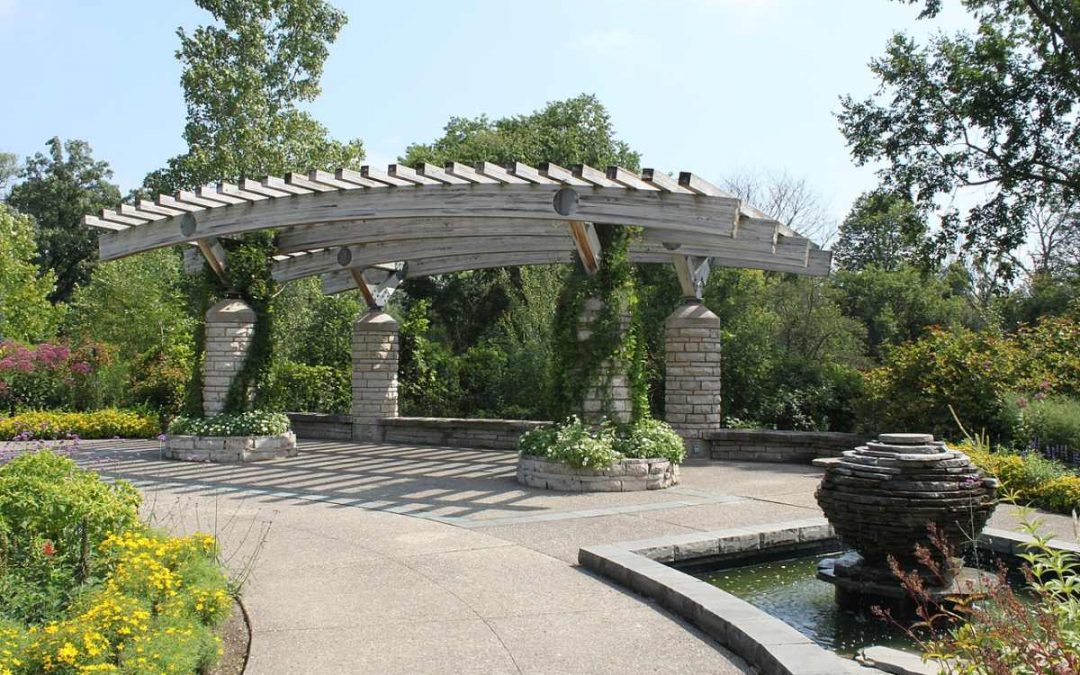With large seasonal changes in temperature, you don’t want to spend hours taking care of your lawn’s maintenance needs. Michigan’s humid summer months and harsh winters can make it difficult to get things done. With low-maintenance landscaping ideas for Michigan, you will worry less about yard maintenance and more about the Wolverines beating the Ohio State Buckeyes.
In this article:
- Mulch Garden Beds
- Grow Native Plants
- Replace Annuals With Perennials
- Mow Less with Groundcovers
- Add Sustainable Hardscaping
- Conserve Water with Xeriscaping
- Eliminate Mowing With Artificial Grass
1. Mulch Garden Beds
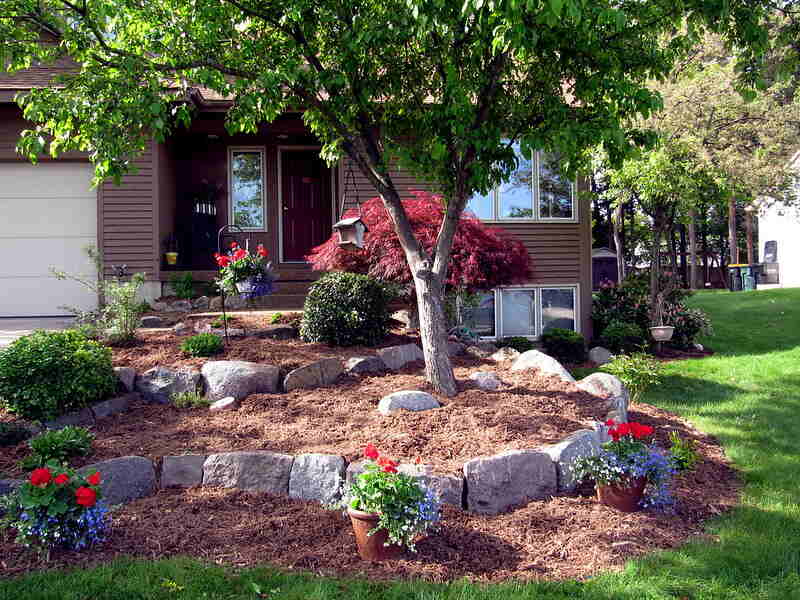
Photo Credit: Rachel Kramer / Flickr / CC BY 2.0
Adding mulch to your flower or garden beds is a simple way to start your low-maintenance landscaping project. Mulch is used to retain moisture in the soil, keep it cool, and suppress weeds. Overall, it can make your garden bed look more attractive.
There are two types of mulch for you to choose from, depending on your landscape preferences.
Inorganic mulch:
- Synthetic with no natural materials
- Doesn’t add nutrients to the soil
- Best for fully blocking weeds
- Includes gravel and stone, plastic and landscape fabric
Organic mulch:
- Not made of anything synthetic
- Can suppress weeds, but not as well as inorganic mulch
- Best for adding beneficial nutrients to the soil
- Includes bark, grass clippings, and shredded leaves
Advantages of mulch:
- Adds nutrients to the soil (if organic)
- Protects soil and roots from harsh weather
- Controls the germination and growth of weeds
- Prevents the loss of soil moisture by reducing evaporation
Estimated cost: The amount you spend on mulch depends on which type you choose. For example, wood mulch costs between $3 to $5 per 2 cubic foot bag.
2. Grow Native Plants
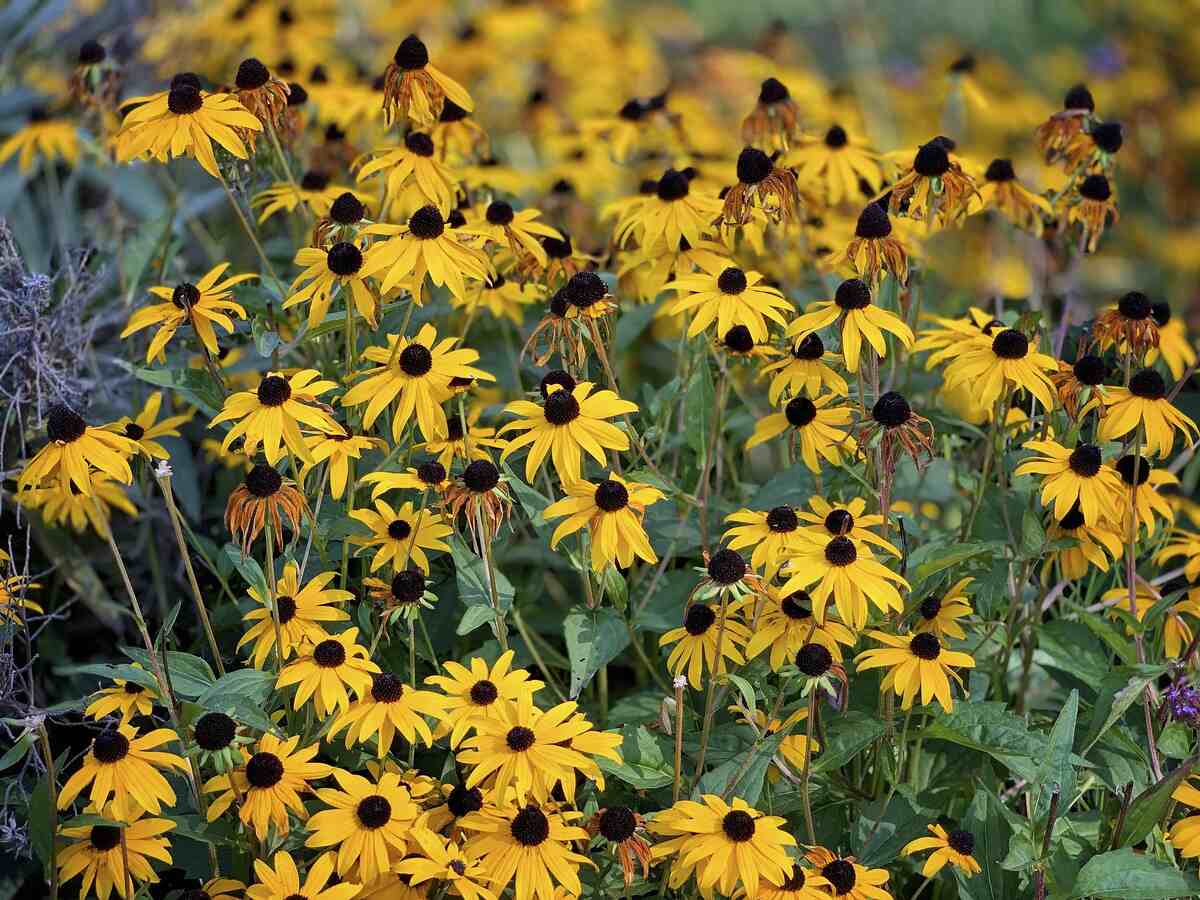
Photo Credit: Garry Knight / Flickr / CC BY 2.0
If you add native plants to your garden, you can sit back and watch them thrive with nothing to worry about. They are adapted to Michigan’s climate and need very little care to survive. They help preserve the local ecosystem and serve as a valuable food source for hummingbirds, butterflies, and other small mammals. Despite minimal watering and fertilizing needs, Michigan’s native plants may still require the occasional pruning.
Below are some low-maintenance plants to consider:
- Black-eyed Susan (Rudbeckia hirta)
- Poke Milkweed (Asclepias Exaltata)
- Daylilies (Hemerocallis)
- Stonecrops (Sedum)
- Wreath Goldenrod (Solidago caesia)
Advantages of native plants:
- Less watering; saves time and money
- Little to no chemical treatments
- Easy to grow
- Heat and drought-resistant
- Occur naturally in the region and habitat
- Less prone to pests and disease
Estimated cost: Depending on the plant’s type and size, expect to pay between $600 and $3,000 per flower bed, $25 and $50 per shrub, $150 and $3,000 per tree.
3. Replace Annuals With Perennials
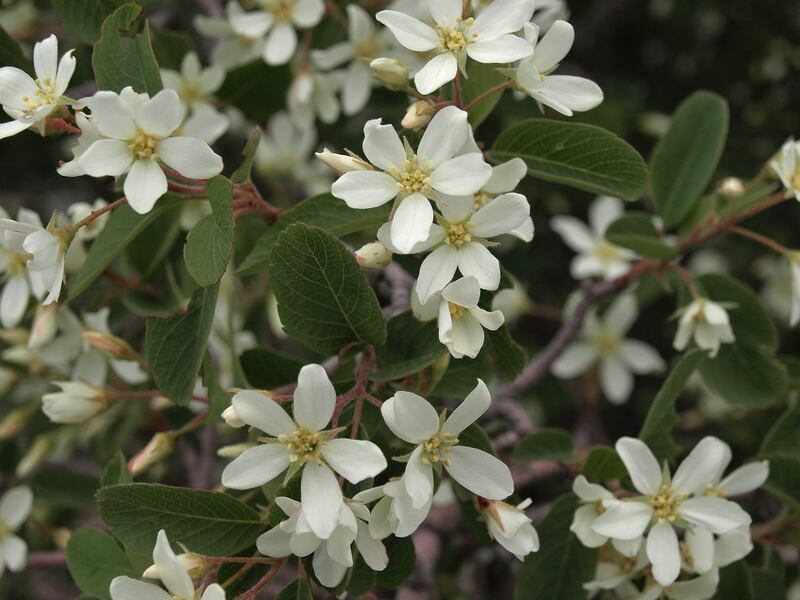
Photo Credit: Jim Morefield / Flickr / CC BY-SA 2.0
Tired of buying new plants every year? That is the problem with annuals, so consider replacing them with perennial plants. They thrive in Michigan’s climate, can live for several years, and require little maintenance once established. Some native perennials will grow to provide lots of shade, so you may sip on those afternoon cocktails and enjoy your outdoor living space.
Here are some suggestions:
- Blackgum (Nyssa sylvatica)
- Hophornbeam (Ostrya virginiana)
- White Oak (Quercus alba)
- Serviceberry (Amelanchier)
Advantages of perennials:
- Grow deep roots that improve the soil’s structure
- Provide shade to the soil and keep it moist
- Time-saving
- Most grow from seeds; affordable for homeowners on a low budget
Estimated cost: The cost of perennials depends on the plant’s size and type. On average, a perennial plant will cost you between $10 and $100.
4. Mow Less With Groundcovers
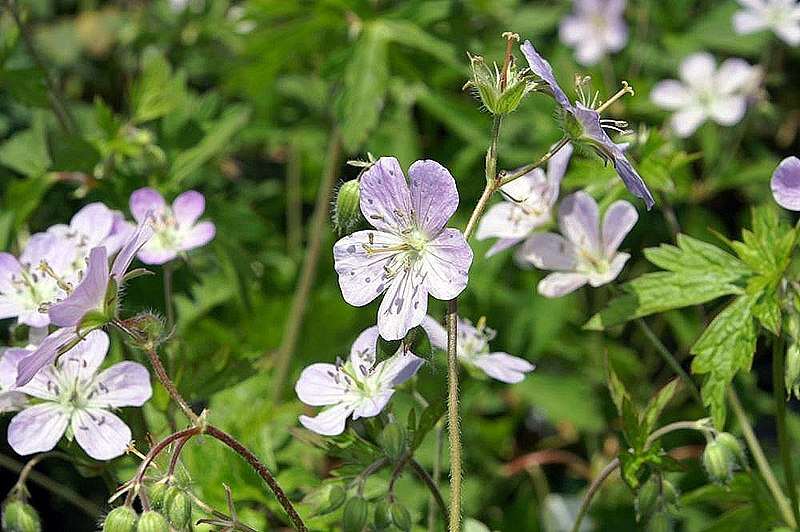
Photo Credit: David J. Stang / Wikimedia Commons / CC BY-SA 4.0
Groundcovers native to Michigan can be a valuable addition to your low-maintenance landscape. These low-growing plants add color and fragrance to your lawn, with no mowing required. By replacing grassy areas, groundcovers will help you spend less time on watering and other maintenance needs.
Examples of groundcovers suitable for Michigan include:
- Moss Phlox (Phlox subulata)
- Geranium
- Hosta
- Pennsylvania Sedge (Carex pensylvanica)
Advantages of groundcovers:
- Lower maintenance requirements than grass
- Attracts beneficial insects
- Reduces the use of chemical herbicides
- Improve your landscape’s aesthetic appeal
Estimated cost: Depending on which type you choose, a groundcover will typically cost you between $4 and $40.
5. Add Sustainable Hardscaping
In addition to native plants, hardscapes are naturally low-maintenance landscaping features. It can be any type of decorative or practical structure in your front or back yard. Hardscape features will not require any watering, pruning, or fertilizing.
However, some installations may still require the occasional upkeep. If you lack experience, consulting or hiring a pro will help you choose the right features for your landscape.
Examples of hardscaping include the following:
- Rock gardens
- Patios
- Concrete walkways and pavers
- Stone walls
- Water features
- Fences
Advantages of hardscaping:
- Improves functionality of your property
- Reduces erosion and enhances drainage
- Conserves water by reducing supplemental irrigation
- Enhances privacy (such as fences)
- Limits the growth of weeds
Estimated cost: The cost depends on the project size and the type of feature you choose. Expect to pay between $1,140 and $3,690 for a water feature, $2,600 and $7,300 for a patio, $2,000 and $4,500 for fencing.
6. Conserve Water With Xeriscaping
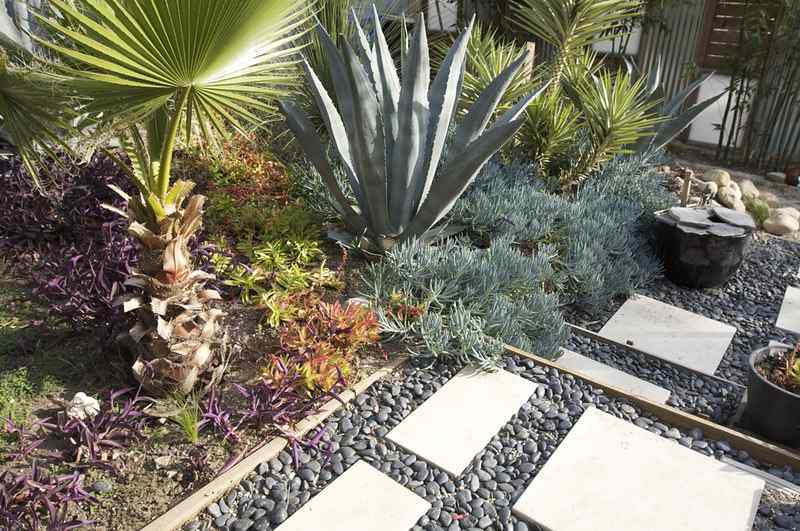
Photo Credit: Jeremy Levine / Flickr / CC BY 2.0
Xeriscaping is a cost-effective idea that helps you obtain a low-water and low-maintenance garden. It aims to use very little water while maintaining an aesthetically pleasing and eco-friendly landscape. Xeriscaping is also wildlife-friendly, attracting beneficial insects, butterflies, and other pollinators.
Some examples of low-maintenance xeriscaping include:
- Shade trees
- Rock gardens
- Drought-tolerant cultivars
- Succulents
- River rocks
- Pea gravel
Advantages of xeriscaping:
- Reduce water bill
- Conserve water
- Less mowing, weeding, and watering
- Promote biodiversity
- Reduce chemical use
- Attract future buyers
Estimated cost: On average, the cost of xeriscaping ranges from $5 to $20 per square foot.
7. Eliminate Mowing With Artificial Grass
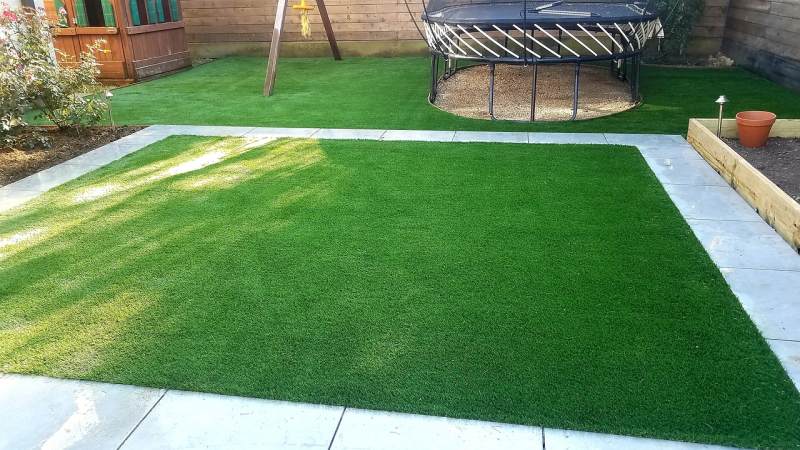
Photo Credit: Pixabay
For a year-round green lawn, replacing your traditional turf with artificial grass is the way to go. Over the years, it has become a very popular low-maintenance landscaping option. It has a very life-like appearance, withstands heavy foot traffic, and reduces the need for chemical fertilizers and pesticides.
Advantages of artificial grass:
- Does not require water or sunshine
- Water-efficient
- Can withstand harsh weather conditions
- Long-lasting solution
- No mowing, fertilizer, or pest control required
Estimated cost: The cost of hiring a pro to install artificial grass ranges from $5 to $20 per square foot on average.
FAQ About Low-Maintenance Michigan Landscaping
Given Michigan’s climate, it is no surprise that cool-season grasses dominate the list for the area’s best turfgrasses. You will still need to consider your soil type and maintenance preferences before choosing the right grass for your Michigan yard.
Kentucky bluegrass is perfect for high-traffic lawns due to its quick recovery from wear and tear. On the other hand, chewing fescue is a fine fescue cultivar that is ideal for shady lawns. Tall fescue is another cool-season grass that can tolerate heat better than others.
To learn more about the grasses that thrive in your region, check out our guide on the best grass types for Michigan.
Ornamental grasses add a natural feel to your landscape. They can be used in groups or specimens, and most types are happy without supplemental water. They only need to be cut back once a year, ideally in spring.
Here are some examples of ornamental grasses for your Michigan landscape:
• Feather reed grass
• Tufted hair grass
• Blue oats grass
• Japanese silver grass
Succulents that are suitable to grow in Michigan will generally survive during the winter. However, below freezing temperatures for long periods can harm the succulents. These plants store water in their stems and leaves, meaning they could die as the water freezes inside them.
Professional Landscaping Services in Michigan
Even the best low-maintenance landscape requires the occasional upkeep. For minimal yard work, you can hire a landscaping company to mow your lawn and maintain your garden beds. Experienced pros also know how to maintain hardscape, irrigation systems, and other features in your backyard.
If you’re looking for a lawn care pro near you to handle the lawn’s mowing, trimming, and edging, we have trusted professionals in Detroit, Grand Rapids, Spring Lake, and many more cities across Michigan.
Main Photo Credit: Gateway Garden, Matthaei Botanical Gardens / Dwight Burdette / Wikimedia Commons / CC BY 3.0

